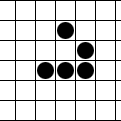 The previously mentioned Curry’s paradox was made famous by science popularizer Martin Gardner . He, as it turned out, promoted the game “Life” by John Conway to the masses. When I saw this name, I immediately remembered… 20 years ago, when there was no smell of laptops and the Internet in my life, I already tried to have fun using electronics. More precisely, with the help of Electronics MK52 – a programmable calculator with a ten-digit display.
The previously mentioned Curry’s paradox was made famous by science popularizer Martin Gardner . He, as it turned out, promoted the game “Life” by John Conway to the masses. When I saw this name, I immediately remembered… 20 years ago, when there was no smell of laptops and the Internet in my life, I already tried to have fun using electronics. More precisely, with the help of Electronics MK52 – a programmable calculator with a ten-digit display. In addition to the calculator, my parents bought me a BRP-4 cartridge with a set of programs. First of all, of course, I was interested in games. Only 20-30 minutes of programming and filling in some memory cells there, and numbers are running across the screen. This is “Landing on the Moon” – a game especially for those with a rich imagination. After lengthy calculations, three numbers appear on the screen – the current acceleration and altitude and fuel reserve. You think and enter your two numbers in response – the duration and the power of turning on the braking rocket engine. The calculator thinks again (about a minute). The task is to land smoothly without breaking through the Moon, or vice versa not to fly out of orbit.So, one of the games on the cartridge was the same “Life” by Conway. Playing it without the proper graphical display turned out to be a task too much for my childish imagination. However, I liked the idea of a self-developing artificial community or a multicellular organism and, as you can see, I remember it:
In addition to the calculator, my parents bought me a BRP-4 cartridge with a set of programs. First of all, of course, I was interested in games. Only 20-30 minutes of programming and filling in some memory cells there, and numbers are running across the screen. This is “Landing on the Moon” – a game especially for those with a rich imagination. After lengthy calculations, three numbers appear on the screen – the current acceleration and altitude and fuel reserve. You think and enter your two numbers in response – the duration and the power of turning on the braking rocket engine. The calculator thinks again (about a minute). The task is to land smoothly without breaking through the Moon, or vice versa not to fly out of orbit.So, one of the games on the cartridge was the same “Life” by Conway. Playing it without the proper graphical display turned out to be a task too much for my childish imagination. However, I liked the idea of a self-developing artificial community or a multicellular organism and, as you can see, I remember it:
- Each cell can be in one of two states: alive (filled) or dead (empty).
- Each move, each cell determines its state and the state of all its 8 neighbors.
- If it is an empty cell and there are exactly 3 neighbors, then this cell comes to life. In all other cases, an empty cell remains empty.
- If it is a live cell, then the number of live neighbors is counted.
- If there are 0 or 1 neighbors, then the cell dies of loneliness.
- If there are 2 or 3 neighbors, then the cell continues to live.
- If there are 4 or more neighbors, then the cell dies from overpopulation.
